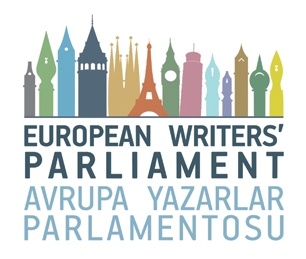Istanbul hosted the European Writers’ Parliament on 25-27 November.  The European writers and critics gathered in Turkey’s capital to share their knowledge and perspective through a series of discussions on various topics of today’s literature.
The European writers and critics gathered in Turkey’s capital to share their knowledge and perspective through a series of discussions on various topics of today’s literature.
These are the parts of author and English PEN deputy president Hari Kunzru’s address to the European Writer’s Parliament:
Writer – neither entertainer nor journalist
I don’t believe the writer is merely an entertainer, though we certainly shouldn’t be above entertainment, above giving pleasure. Nor are we just journalists, recorders of the doings of the world, or apolitical bohemians, dedicated to aesthetic shock. We may be any of these things, but this is not all we are.
As lovers of language, as people who are dedicated to it and who value it very highly, we are – whether we like it or not – always already engaged in the political struggles of our day, many of which take place on the terrain of language – its use to produce social and national identity, its use to frame laws and norms, its use to define what it means to be a human, to lead a good or just or valuable life.
There are many things we could spend the next few days discussing but I’d like to propose three areas where I think we can do useful work.
I
The first is in what I would call the space of literature:
New technologies of communication and distribution of information have already changed the space in which we, as writers, live and work. The transnational networks are now the place in which we make our writing, where we research, where our work is archived and where we reach our readers.
What kind of information space do we, as writers, want to occupy? Where do we want to live and work? What values should be embedded in that space, what protections, what sanctions?
Issues such as net neutrality (the equality of all information traffic), censorship, data collection, personal privacy, and the lack of a persistent archive are of great importance to us. But there are two major tendencies emerging, both of which are having a profound impact.
impact.
The first is the emergence of open and collaborative ways of producing and sharing information.
The highest profile example of this is Wikipedia. We should support an ethic of openness. However, in this world of sharing and infinite reproducibility, the value of our labor is being driven down. People want us to work for free. How are we to live, as writers? Should we even expect to live from writing?
The second is the privatisation of public space.
We live in a period of enclosures unparalleled since the sixteenth century. All around, resources are being privatised, and cultural resources are chief among them. We communicate using private services which own the content we create. Send a message on a social network like Facebook, post a picture or write a text and you do not own your words. You are adding value to the company, and you have little control over how your data is used.
This is just the tip of the iceberg. When social and cultural life takes place on privately-owned networks, the values of the owners inevitably dominate. At the moment the internet is held open for us by international protocols and conventions.
We need to recognise, as writers, how important they are, and to participate in their maintenance and formulation. It is my hope that this meeting recognises the importance of information as a commons, a good that should be freely accessible and shared by all, while also recognising that the production of information is labour, and has value.
II
The second area of concern is the so-called war on terror, a phrase which has, of late, been retired by those who originated it, now it has come to indicate something quixotic and sinister, instead of the noble enterprise it was once claimed to be.
Nearly a decade after it was inaugurated, this is the conceptual frame under which we are forced to live and speak and write. Ordinary laws, and ordinary canons of decency and civility have been suspended. We are in a perpetual state of emergency, with no end in sight. It seems clear that this state of exception is very useful in organizing and controlling the citizenry.
But what should concern us as writers is the way the war on terror has degraded language. It is not only the brutal neologisms, the jargon and the corrosive euphemisms which have become part of our linguistic currency – extraordinary rendition, harsh interrogation techniques, enemy combatant — a list of words whose intention is to deceive – to which one might also usefully add words like “martyr” and “crusa der”, for the deception is not merely one-sided.
der”, for the deception is not merely one-sided.
Above all the degradation is a degradation of our thought by crude oppositions, talk of a “clash of civilisations”, or any number of other binary formulations which serve to harden the lines between ordinary people who have no stake in this so-called global war.
The cynics on both sides who are manipulating this situation accuse anyone who questions the absoluteness of their oppositions of a kind of moral relativism. In fact, just the opposite is true. As writers, as lovers of language, we should work to preserve the truth of our words, to call things like torture by their proper names, or if those names are worn out to find new ones. We should cherish debate, and use the full power of language to overcome crude binarisms.
III
The third area of concern for us as writers is the use of language to produce identity. In the European context this is particularly crucial, as the economic crisis is immiserating large numbers of people, who are – as always in European history – turning towards xenophobia and atavistic nationalism in the hope of identifying an enemy more tangible than global capital.
It seems to me that multiculturalism, once a useful and progressive kind of politics, is no longer functioning as well as it did. The limits of identity politics are becoming clear.
Instead of a playful, creative blending of the best of host and migrant cultures, the terms of multiculturalism are increasingly used by cultural conservatives of all stripes to police cultural boundaries.
A liberal politics of absolute inclusivity, while presenting itself as pragmatic, has the disadvantage of obscuring genuine differences and antagonisms. Identity politics, which privileges categories like race and religion, is wilfully silent about class.
Culture is, self-evidently, at the heart of this, and so we as writers have a central role to play. It sickens me to watch European bigots puffing up their chests about the values of the Enlightenment, as a badge of their superiority against poor and marginalised immigrant populations.
Again, I say that opposition to this Enlightenment fundamentalism, isn’t moral relativism, but an ethical imperative. At this point, respecting difference is important, but so is asserting our common life across borders of race, class and religion. The fake pageantry of respect is no substitute for a genuine internationalism.
There are many weapons in the culture war, but chief among the techniques of policing thought and writing is that of offence. We are familiar with the use of the notion of offense by religious and ethnic minorities to gain identity-political purchase – from the Rushdie fatwa to the Mohammed cartoons, the martialling of sentiments of shame and abused honour have generated a lot of heat and not much light.
No impact on culture without free speech
I believe that the right to freedom of speech trumps any right to protection from offense, and that it underlies all the other issues I’ve been speaking about. Without freedom of speech, we, as writers, can have very little impact on culture. In saying this, I’m aware that this is a prime example of a concept which has been degraded by the war on terror – that many European Muslims misidentify it as a tool of Anglo-Saxon interests, a license to insult them, rather than the sole guarantee of their right to be heard.
Our kind Turkish hosts have invited us here, as an international group, to air our views, and so it is my belief that we must not shy away from recognising the situation here, where we are speaking. I know by doing so, as a guest, I risk giving offence, but it w ould be absurd to assert freedom of speech in the abstract without exercising it in concrete terms. I want to name two writers who are not present, the nobel-prize winning novelist Orhan Pamuk (above) and the editor Hrant Dink (right).
ould be absurd to assert freedom of speech in the abstract without exercising it in concrete terms. I want to name two writers who are not present, the nobel-prize winning novelist Orhan Pamuk (above) and the editor Hrant Dink (right).
Both these writers, and many others, had cases brought against them under article 301 of the Turkish penal code which makes it illegal to insult Turkey, Turkish ethnicity or Turkish government institutions. In its initial formulation, when it was promulgated in 2005, it was a crime to insult “Turkishness”. Pamuk faced trial for giving the following statement to a Swiss magazine “30,000 Kurds have been killed here and a million Armenians. And almost nobody dares mention that. So I do.”
Dink, one of Turkey’s most prominent Armenian voices was convicted under article 301 and then murdered by a young nationalist, who was subsequently photographed in a police station, surrounded by smiling officers, against the backdrop of the national flag.
There are many other examples in Turkey of the weapons of offence and insult being used to silence dissent. Turkey is obviously not alone in this, but since we are here, it is important that we acknowledge it. I believe that one of the most tangible and immediate results of this meeting would be to call for the repeal of section 301 and a declaration that no European writer should have to operate under the threat of similar laws.
Read the full speach here.
Hari Kunzru is the author of three novels, as well as journalism and other writing. He is Deputy President of English PEN.
HRH London, based on Index on Censorship information.
Related links:
Turkey: Publisher Ragip Zarakolu back on trial again, alongside Mehmet Güler
Turkey: Publisher R.Zarakolu acquitted – Writer M.Güler sentenced to 15 months
Turkish journalist has been sentenced to 15 months in prison under draconian anti-terror laws
Singapore arrests British writer for defamation
Writer Yu Jie ignores threats of prison to publish a book about Chinese Premier


